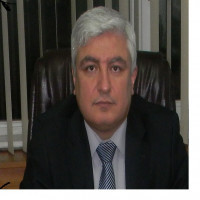Research Article
Issue Reviewers



Yazar 1977 yılı Kastamonu doğumludur. Yazar lisans eğitimini 2000 yılında Hacettepe Üniversitesi İngilizce Öğretmenliği bölümünde, yüksek lisans eğitimini 2016 yılında Ankara Üniversitesi, Eğitim Bilimleri Enstitüsü, Eğitim Yönetimi Ana Bilim Dalı’nda tamamlamıştır. “Eğitimde Veriye Dayalı Yönetim Uygulamalarının Değerlendirilmesi” başlıklı tezi ile 2022 yılında Gazi Üniversitesi, Eğitim Bilimleri Enstitüsü, Eğitim Yönetimi Ana Bilim Dalı’ndan doktor unvanı almıştır. Yazarın çok yazarlı “Sosyal Bilimlerde Veri Madenciliği” ve “Veriye Dayalı Yönetim” başlıklı kitapları basılmıştır. Yazarın 2023 yılında “Etik Liderlik”, “Veri Yönetimi” ve “Eğitimsel Büyük Veri ve İşlevleri” başlıklı kitapları yayımlanmıştır. Yazarın yurtiçinde “Lise Müdürlerinin Ders Denetim Görevlerine İlişkin Öğretmen Görüşleri”, “The Evaluation of the Data-Driven Management Applications in Education” ve “A Scale Development Study: The Evaluative Scale of Data‐Based Management in Education” başlıklı makaleleri yayımlanmıştır. Yazarın “Relationship between Teachers' Workplace Friendship Perceptions and Conflict Management Styles” ve “Educational Big Data and Its Functions” başlıklı yurtdışında yayımlanmış makaleleri vardır. Yazar devlet okullarının farklı kademelerinde 22 yıl İngilizce öğretmenliği yaptıktan sonra 2022 yılında idarecilik görevine başlamıştır. Yazarın YKS İngilizce sınavlarına dönük yayımlanmış çalışmaları da mevcuttur. Yazar farklı kurumlarda birçok Erasmus+ projesinin yürütücüsü olarak görev almış ve bu alanda çalışmalar yürütmeye devam etmektedir. Yazar evli ve iki çocuk babasıdır.




Aim & Scope
The integration of social and scientific issues in mutual pattern to resolve real world problems has extreme importance in contemporary world. This will lead more inhabitable environment in sustainable manner. This journal provide elaborative medium for discussion from industrial entrepreneur and academicians to politicians.
This journal covers both social and natural sciences in pure and applied perspectives which puts education and pschology in central position issues. The journal will be published two times per annum on July and December. Both original research paper and comprehensive reviews can be accepted and published after open peer review process also regorous conceptual position papers and key studies will also be wellcomed. Generally, the manuscript will be sent at least two referees after editor initial evaluation. The journal provides a full scientific platform. Therefore, any type of plagarism, makeup and repetitions are subject to all authors. All the copyrights will be on the hand of journal after the acceptance of the manuscript.
Author Guidelines
Submission of Papers: Manuscripts for publication may be sent to the dergi park systems. Although this journal is international in scope, all articles must be in the English language. Potential contributors whose first language is not English are urged to have their manuscript competently edited prior to submission. Papers should be written in the third person in an objective, formal and impersonal style.
Manuscript Preparation General: Manuscripts must be typewritten, single-spaced with page margins (each margin 2.5 cm) on one side of white paper with one column in 12 pt Times New Roman style with WORD or Latex format. The corresponding author E-mail address ull postal addresses have to be identified and included. Also E-mail address and full postal addresses must be given for all co-authors.
Abstracts: Each manuscript must be included a brief abstract and a short list of keywords (For example: Keywords: Education; Child; Playing; Nutrition).
Graphical Abstract: Optional but highly advised. A tematic figure summarzing or punctuating the whole or crucial part of the manuscript.
Highlights:Optional but strongly advised. Three items which contains at least one statement on the importance of manuscript.
Text: Follow this order when typing manuscripts: Title, Authors, Affiliations, Abstract, Keywords, Introduction, Main text, Conclusion, Acknowledgements, Appendix, References, Vitae and Figure Captions followed by the Figures and Tables in convenience to the manuscript. Alternatively, manuscript can be prepared on the supplied template. The corresponding author should be identified with an asterisk and footnote.
Formulas and Equations: Each formulas and equations must be written with computer equations tools. They not be shown in picture formats as jpeg, png and other formats.
Symbols and Units: All Greek letters and unusual symbols should be identified by name in the margin, the first time they are used. SI units should be used wherever possible.
References: The last version of APA style.
Manuscript Template: Click here for the article submission template.
Ethical Principles and Publication Policy
Publication Ethics
Publication processes of Social Scientific Centered Issues are based on producing, developing and sharing knowledge evenhandedly within scientific methods.
Refereed articles are studies require scientific methods and they provide objectivity. All components of publication process (publisher, editors, authors, reviewers and readers) should obey ethical rules for scientific production. Within this context, the policies of ‘publication ethics’ and ‘open access’ also require all components of publication process to obey the ethical principles, in direction of guides and policies of Committee on Publication Ethics (COPE), as “Code of Conduct and Best Practice Guidelines for Journal Editors” and “COPE Best Practice Guidelines for Journal Editors”.
In case we identify that author(s) of the manuscript use(s) falsified and fabricated data, then we will report this to the institution of the authors where he/she works and reject the manuscript. Editorial members of the journal and/or the reviewers reserve the right to ask author(s) to provide raw data which was used in the manuscript.
Ethical Responsibilities of the Publisher
Social Scientific Centered Issues Administrative Committee constitutes Editorial Board of Social Scientific Centered Issues. The members of Editorial Board are assigned for three years considering the disciplines of educational sciences. An editor is assigned as the chair of Editorial Board with two assistants and field editors. A new member is assigned for the leaver and Editorial Board can enlarge membership times. According the subject of the study, the editor can send an article to some other instructors out of Editorial Board as field editors.
The Responsibilities of Editorial Board of Social Scientific Centered Issuesof Educational Sciences
• Editorial Board of Social Scientific Centered Issuesis responsible for all processes of the articles sent to the journal. This responsibility requires deciding independently by considering public interest, not personal gains. The relationship between Publisher and the Editorial Board is based on independence policy, and all decisions of the editors are independent from the publisher and the other persons and institutions.
• Editorial Board of Social Scientific Centered Issuespermanently strives to develop and raise the quality of the journal.
• Editorial Board of Social Scientific Centered Issuesdetermines and performs journal policies as publication, blind review, evaluation process and ethical principles.
• Editorial Board of Social Scientific Centered Issueskeeps copyrights of the articles published in Social Scientific Centered Issuesof Educational Sciences.
• Editorial Board of Social Scientific Centered Issuesis responsible for keeping intellectual property rights of authors in publication processes and guarding against unethical behaviors, plagiarism and reference gangs.
• Editorial Board of Social Scientific Centered Issuesprepares a “Guide for Authors” to inform authors and “Guide for Reviewers” to inform reviewers about evaluation processes.
• Editorial Board of Social Scientific Centered Issuesdetermines incentive policies for the authors.
• Editorial Board of Social Scientific Centered Issuesher keeps records of every article electronically or in written forms.
The Responsibilities of Editors, Editor Assistants and Field Editors
• Editors try to inform reviewers, authors, researchers and readers, to answer their questions clearly within the principles of clarity.
• Editors, during the publication process, consider that the articles should be original and contribute the literature, the readers and researchers.
• While editors are making decisions about the article publication, they consider originality, contribution to the field, clarity of expressions, content and validity and reliability of the articles.
• Editors take the articles without any problem to the preliminary evaluation, consider positive views of reviewers, and they do not change the decisions of the reviewers unless there is a big problem for publishing.
• Editors implement the policies of blind review and evaluation processes, keep private personal identity information of the authors, and provide impartial evaluation processes in due of time for the articles.
• Editors send the articles to field editors and reviewers considering their professional fields, and care that the articles are evaluated impartially and independently.
• Editors, in evaluation processes, consider if there are conflicts or collaborations between authors and reviewers or not.
• Editors generate a large number or reviewers, and they update it consistently.
• Editors prevent non-scientific that do not comply with academic etiquette rules.
• Editors ensure that journal publishing processes are operated in accordance with publishing policies and guidelines, inform those who are in the process of the developments on publishing policies, and prepare training programs when necessary.
• Editors communicate effectively with everyone involved in the publishing processes, and organize meetings at regular intervals.
• Editors provide protection of personal data in assessed articles; they keep personal data of authors, referees and readers.
• Editors attach importance to the protection of human and animal rights in the articles, emphasize that the clear approval of the participants of the article is documented, and rejects the articles witout the approval of the ethics committee on the participants of the article and without any permit in experimental investigations.
• Editors take precautions against misconduct. When there are complaints about the abuse of duty, they share the findings about the subject by conducting an objective investigation.
• Editors provide errors, inconsistencies, or misleading errors in articles to be corrected.
• Editors protect the intellectual property rights of the published articles, and defend the rights of the journal and the author (s) in case of violation. Editors also take the necessary precautions to ensure that the content of the published articles does not infringe the intellectual property rights of other publications; they control authenticity-similarity.
• Editors considers consistent critiques for the articles published in the journal and enables authors to answer these critiques.
• Editors considers the studies including negative conclusions also.
• Editors evaluate the complaints sent to the journal and make necessary statements.
Ethical Responsibilities of Reviewers
The articles in Social Scientific Centered Issuesare evaluated by double-blind review in a process, which neither the authors know the reviewers nor the reviewers know the authors; reviewers cannot communicate the authors directly; article evaluation forms and proofreading requests are sent to the authors through the website of the journal. Reviewers must bear the ethical responsibilities in Social Scientific Centered Issuesas below:
• Reviewers should only accept to evaluate the articles related to the field of their specializations.
• Reviewers should make the evaluation impartially and confidentially. In accordance with this principle, the articles they review should be annihilated after the evaluation process, but they should be used after publication. Nationality, gender, religious beliefs, political beliefs and commercial concerns should not distort the impartiality of the evaluation.
• When reviewers understand that there is a conflict or collaboration, they should inform the editors and refuse to evaluate the article.
• Reviewers must evaluate articles with a constructive attitude in accordance with the academic etiquette rules; they should refrain from insulting and hostile personal comments.
• Reviewers should evaluate the articles they agree on during the evaluation.
Ethical Responsibilities of the Authors
The ethical responsibilities of the authors that apply to Social Scientific Centered Issuesas below:
• The authors should not send an article published in or sent to be published in another journal Social Scientific Centered Issues at the same time.
• The authors should send original articles to Social Scientific Centered Issues of Educational Sciences. Authors should refer to the sources they use in writing articles in the correct way in the direction of ethical principles.
• Persons who do not contribute to the articles should not be listed as authors, and it should not be proposed to change the author order of a published article and to add authors.
• Reviewers must notify the editors of the conflicts and collaborations about the article.
• In the evaluation process of the articles the authors should provide the editorial staff with information about the articles or the raw data if required.
• The authors must document the rights to use the data they use in their articles, the permission for research or the approval of the participants to whom they have searched.
• Authors should communicate with the editors to provide information, to correct the article or to withdraw it when they are aware of the error associated with the evaluation and early appearance phase or the published article in electronic form.
• The author(s) must specify that they received the ethics committee approval for the researches that require data collection by using quantitative or qualitative methods such as experiment, survey, scale, interview, observation, focus group work that require ethics committee decision; the author(s) must also specify the name of the ethics committee, the date and the number of the ethics committee decision on the first-last page and in the method section of the candidate article. In addition, the author(s) must include information on the fact that the informed consent form was received for the case reports in the articles.
• The author(s) should present proof of their ethical principles for data collection process (such as obtaining permission from others to use their documents such as scale, questionnaire, photograph etc.) in the article. It should be noted in the articles that the copyright regulations for research and publication ethics and intellectual and artistic works are complied with. If the study is conducted on human and animal subjects, it should be reported in the article that the study was carried out in accordance with international reports, guidelines, etc.
• Ethics committee approval is not required for review articles from the author(s). However, it should be stated in articles not requiring an ethics committee decision that the ethics committee decision is not required on the first-last page and in the method section of the article.
Notification of Ethics Non-Principles Status Editor
In case of encountering an unethical situation in articles or about editors, reviewers and authors or in articles that does not comply with the ethical principles regarding in the Journal of Social Scientific Centered Issues, it should be reported by baydinli@gmail.com
Price Policy
Social Scientific Centered Issues author / authors in no way ARTICLE PRINTING FEE, etc. things are NOT WANTED.

Bu eser Creative Commons Atıf 4.0 Uluslararası Lisansı ile lisanslanmıştır.
Eurasian Scientific Journal Index | Türk Eğitim İndeksi | Asos Index | Google ScholarGoogle Scholar |







